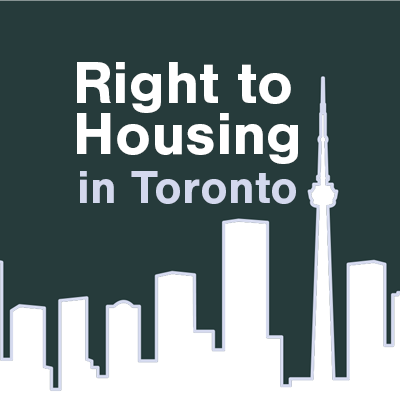Advocates raise awareness on discrimination in housing
Advocates raise awareness on discrimination in housing

Bahar Shadpour, manager of Policy, Communications and Engagement for CERA
Hold governments accountable to allow Canadians to claim their right to decent, affordable housing
July 19, 2021
By Veronica Silva Cusi
The Philippine Reporter
Advocates fighting for rights of Canadians to suitable and affordable housing are raising awareness on systemic barriers that people face in their quest for decent living.
Member groups and individuals in the Right to Housing in Toronto (R2HTO) network and the Centre for Equality Rights in Accommodation (CERA) have been organizing workshop series to bring together tenants, landlords or housing providers, communities, service providers, and policy experts to help address some systemic issues in housing.
 Last July 6, CERA and R2HTO organized a workshop on systemic discrimination in housing, particularly for those in low-income and racialized communities.
Last July 6, CERA and R2HTO organized a workshop on systemic discrimination in housing, particularly for those in low-income and racialized communities.
Speaking to The Philippine Reporter after the workshop, Bahar Shadpour, manager of Policy, Communications and Engagement for CERA, said they are bringing rights-based approaches and strategies to address housing issues in the city and throughout Canada.
CERA is a non-profit established in 1987 working to advance the right to housing in accordance with international, national, and local policies.
With the workshops and other advocacies, such as talking to tenants and housing providers, “what we’re trying to do is talk about the many challenges that people have with their housing. … We build awareness on what right to housing means and how people can claim this right,” said Shadpour.
Housing advocates are closely monitoring Canadian governments’ action on housing policies. At the national level, there is the National Housing Strategy Act passed in 2019. In Toronto, there is the HousingTO 2020-2030 Action Plan that updates the earlier 10-year plan. Canada is also a signatory to the International Covenant on Economic, Social and Cultural Rights (ICESCR).
Despite these policies, there are still nagging issues, including discrimination.
 According to Statistics Canada, in the 2016 Census, 18 per cent of racialized individuals are in core housing need compared to only nine per cent of non-racialized individuals.
According to Statistics Canada, in the 2016 Census, 18 per cent of racialized individuals are in core housing need compared to only nine per cent of non-racialized individuals.
Statistics Canada measures “core housing need” according to adequacy, affordability, and suitability of housing.
• Adequacy refers to whether the housing requires major repairs.
• Affordability is measured by how much of the income is spent on housing. That is, housing should be less than 30% of total before-tax household income.
• Suitability refers to the size of the housing unit compared to the number of people living in it. In other words, is the housing overcrowded or not?
According to a report by Colour of Poverty, 50 per cent of racialized households are living in unaffordable and overcrowded housing.
Shadpour noted that while it is clear from policies, including the Ontario Human Rights Code, that there should not be discriminatory practices in housing, there are still some Canadians who get discriminated.
According to the OHRC, people cannot be refused rental space or harassed on the grounds of race, colour or ethnic background; religious beliefs or practices; age; sexual orientation, family or marital status; disability; whether they are receiving public assistance, and other reasons.
CERA documents other types of discrimination, such as harassment due to the type of cuisine the renters cook, and the number of children in the rental space.
“We have a really strong Ontario Human Rights Code that’s supposed to protect people from discrimination,” said Shadpour. However, protection is still a challenge.
“The process to take claims to the tribunal [Human Rights Tribunal of Ontario] is lengthy and complex, just like how it is with court processes,” she added. “It’s very hard for people to wait long. … People need housing right away, and they need the harassment to stop.”
She also noted that both tenants and housing providers also sometimes do not know their rights. That is why CERA and their partners are bringing awareness on these rights.
Their advocacy includes submitting recommendations or position papers to policymakers. For example, earlier on in the pandemic, R2HTO submitted a four-part, human rights-based response to how the City of Toronto can help those affected by the pandemic, including protecting the homeless and vulnerable tenants.
Shadpour said a lot of these issues on housing, such as affordability and overcrowding, have been existing even before COVID-19. The pandemic brought these issues to the surface.
In an open letter to the three levels of government, housing advocates also called for a stop to evictions, among other recommendations.
Shadpour said CERA has also submitted to the federal government a rent relief program for residents, similar to the federal program for businesses.
Housing advocates are also talking about issues around encampments and rooming houses. Shadpour said shelters that are supposedly for short-term and emergency uses have become long-term options for some as housing in not affordable in the City of Toronto. Rooming houses, on the other hand, are attractive to low-income renters, newcomers, and students. Currently, rooming houses are legal only in select zones in Toronto.
In Toronto, housing advocates are closely monitoring the appointment of the city Housing Commissioner as proposed in the new 10-year housing plan.
Said Shadpour: “The commissioner’s office will be able to look at everything housing and specifically to alarm the city about systemic housing issues, such as discrimination. They [the office] are the ones that will raise these [issues] when it comes to the development of policy and then, for the city to be able to address them.”
CERA and R2HTO are organizing three more workshops. More details can be found on their website: https://www.equalityrights.org/events and https://right2housingto.ca/2021-workshop-series/.



Comments (0)